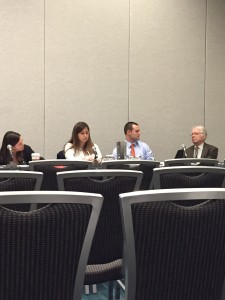Mark Twain falsely portrayed Hawaiians as behind the times, one professor concluded at the 2015 Modern Language Association convention in Vancouver, Canada.

Professor Molly Ball [pictured second from the left], an instructor at UC-Davis focusing on early American literature, culture and queer and feminist theory, provided some background about how Hawaii was annexed by the U.S. She blamed “the growing influence of Americans [in Hawaii, that] led to a coup” and “paved the way to Hawaii annexation.” Before being annexed, Ball noted, “[Hawaii] was certainly experiencing serious threats to its national body.”
Too often, Twain and other American writers looked down on the “disjointed and inarticulate” Hawaiian natives, who were “perilously out of sync…caught between a traditional past and modern present,” Ball alleged. Twain wrote in such a way, that “the Hawaiian kingdom is portrayed as disintegrating” and “functioning alternately as economic resource to be exploited” and “territory to be annexed.”
Interestingly, Twain’s observations about Hawaii were so positive, contrary to Ball’s assertions, that they are used in travel brochures for the fiftieth state to this day. “No alien land in all the world has any deep strong charm for me but that one, no other land could so longingly and so beseechingly haunt me, sleeping and waking, through half a lifetime, as that one has done,” Twain wrote. “Other things leave me, but it abides; other things change, but it remains the same.”
“For me the balmy airs are always blowing, its summer seas flashing in the sun; the pulsing of its surfbeat is in my ear; I can see its garlanded crags, its leaping cascades, its plumy palms drowsing by the shore, its remote summits floating like islands above the cloud wrack; I can feel the spirit of its wildland solitudes, I can hear the splash of its brooks; in my nostrils still lives the breath of flowers that perished twenty years ago.”










